Washington State’s AgForestry Leadership program is an 18‑month course that helps professionals in agriculture, forestry and natural resources build their industry knowledge, learn leadership and communications skills, and connect with peers across the state. The program consists of 11 seminars held across the state on topics including government, economics, international trade, communication, water issues, media relations, and the environment. The program also includes a week-long trip to Washington, DC, and a 2‑week international trip.
Class 41 has just graduated from the AgForestry Leadership program. In this feature, Irrigation Leader interviews four of the new graduates—Craig Gyselinck, Jenny Knoth, Kelly Lawrence, and Brock Leonard—about their experiences in the program, their trip to Cambodia and Vietnam, and how the knowledge and skills AgForestry has given them will further their professional careers.
Craig Gyselinck
Environmental Assistant Manager, Quincy–Columbia Basin Irrigation District Quincy, Washington
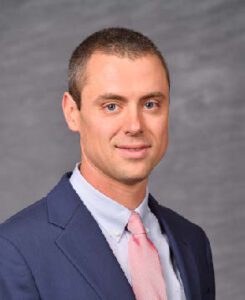
Irrigation Leader: Please tell us about your background and how you came to be in your current position.
Craig Gyselinck: I am the environmental assistant manager at the Quincy–Columbia Basin Irrigation District (QCBID). I’m involved in ensuring that the water that we deliver to farms is of proper quality and quantity. I do a lot of weed control and also review how environmental laws and regulations affect our business.
Irrigation Leader: Why did you apply to the AgForestry program?
Craig Gyselinck: A number of individuals with whom I’ve worked and whom I look up to have gone through the program, including QCBID’s former general manager, Darvin Fales, and its current manager, Roger Sonnichsen. They all spoke highly about how this program helped accelerate their careers, gave them leadership skills, and taught them about how our business is connected to the nation and the world. That piqued my interest in this program and led me to apply.
Irrigation Leader: Please tell us about your experience in the program.
Craig Gyselinck: The AgForestry program is a leadership development program. It helped me understand the impacts that I can have as a leader in two main ways. First, it helped me develop leadership skills. Second, it helped me gain a larger perspective on the industry we work in. The first half of the 2‑year program is focused on developing leadership skills. The seminars deal with working with the media, public speaking, listening, and so forth. The second half of the program is focused on developing a big-picture understanding of what’s occurring in our industries and how other industries affect the work that we do. I was surprised by how connected the agricultural industry is with the rest of the world. One example is that I had never thought about how important the roads, ports, and other transportation infrastructure in Seattle are for delivering the products that we help grow around the rest of the world. I didn’t realize how connected Washington’s agriculture industry is with the rest of the world.
Irrigation Leader: Did you have any kind of interaction with the state legislature as well?
Craig Gyselinck: Yes; one of my favorite seminars focused on the state government and the state legislature. It helped me realize that I could make a difference in the legislature. It’s something that I didn’t know that much about when I started the program. As part of the AgForestry program, we had to do a public policy project. My group focused on trying to pass a bill to provide more funding for search-and-rescue programs. We actually worked through the process. It was quite a learning experience for me and showed me how the state legislative system works.
Irrigation Leader: Did your group successfully pass the bill?
Craig Gyselinck: We got quite a ways into the process, and our bill was on its way through the Senate, but with the COVID-19 pandemic, our bill got put on hold. We met with legislators and local community leaders and received a lot of support, which was really great.
Irrigation Leader: Would you tell us about your experiences on the tour of Cambodia and Vietnam?
Craig Gyselinck: The international trip component of this program is really designed to help us see where we sit in in the world. It was amazing for me to see that the small part I play in helping the QCBID deliver clean and reliable water to farmers for their crops contributes to providing apples to Vietnam. That was one of my takeaways, and it is something that I’d never thought about before. The international trip really showed me how connected we are with the rest of the world and how each of our small parts within the agricultural industry helps contribute to providing food globally.
Irrigation Leader: Did you make any observations about water delivery as it occurred there?
Craig Gyselinck: My biggest takeaway for both Vietnam and Cambodia was that environmental regulations were not as stringent there as they are here in the United States. As agricultural producers, we often disagree with the level of environmental regulation that we have to deal with. In Vietnam, there was little environmental regulation at all, and you could see that in the quality of the water that was delivered to the farms and in the air quality there. Another takeaway from Cambodia had to do with leadership. We learned about some difficult topics such as the Khmer Rouge regime and the killing fields. I learned how poor leadership can lead to atrocities and significant human suffering.
Irrigation Leader: How will your time in the AgForestry program inform your professional work in the future?
Craig Gyselinck: Not only did the program help me build skills, it helped me recognize blind spots and areas I needed to work on. Going through the AgForestry program will help me be a better, more thoughtful leader. It has made me more confident in areas such as public speaking and listening. It has helped me better understand how to be a leader and how the decisions I make now or in the future affect the people that I work with and our industry as a whole.
Irrigation Leader: What is your message to anyone who is considering applying for the program?
Craig Gyselinck: The AgForestry program provides valuable, real-world lessons on leadership and how our industry fits in with the rest of the world. I would strongly encourage others to look into the program. I believe that I will take some of the skills that I learned with me for the rest of my life and that the people I met and worked with will be lifelong partners, people whom I can consult and work with in the future.
Craig Gyselinck is the environmental assistant manager at the Quincy–Columbia Basin Irrigation District. He can be contacted at cgyselinck@qcbid.org.
Jenny Knoth
Lead Forester, PNK Consulting Olympia, Washington
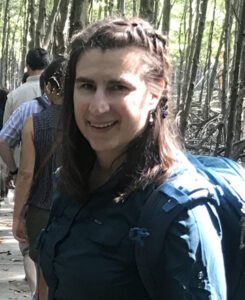
Irrigation Leader: Please tell us about your background and how you came to be in your current position.
Jenny Knoth: My background is in forest genetics and growing trees for bioenergy, which was the focus of my PhD project. That turned into supporting and advocating for different landowners across the Pacific Northwest. I currently work as a forest management and policy advisor. As an independent consultant, I work for companies on projects for which they don’t need to hire a full-time employee. I also provide scientific support for small forest landowners. My clients are located across the Pacific Northwest, from Washington to California.
Irrigation Leader: Why did you apply to the AgForestry program?
Jenny Knoth: A colleague suggested that I apply early on while I was working for Green Crow, a forest management company based in Port Angeles, Washington. At first, I thought it would take too much time, but I eventually applied to the program both because of the value of the leadership training it offers and because of the alumni. Some great mentors of mine have come from the AgForestry program; I wanted to get the same kind of experience they had and to meet people in the agriculture and forestry sectors from across Washington State.
Irrigation Leader: Please tell us about the experience of the program.
Jenny Knoth: The program lasts 2 years and follows the academic year schedule, meaning that we had the summers off. Once a month, we met for 3‑day seminars, which were really intense. I appreciated the expectation that we put away our work, our cell phones, and our computers during the seminars. We took a break from our everyday responsibilities and focused on learning leadership skills. That was valuable because it can be easy to lose focus on a meeting or workshop if you’re also trying to do other work at the same time. In this case, all 21 members of our class were engaged and on the same page.
The other thing that I really appreciated was that every seminar was held in a different location. We covered almost every area of our state and almost every aspect of our agriculture and forestry industries, sometimes in unexpected ways. When we went to the Port of Seattle, I wondered what it had to do with my business, but I realized that all our commodities and goods can be affected by the business at the port. The AgForestry program gave us a behind-the-scenes look at some of those mechanisms. That put what we do into perspective and gave us all a better understanding of our roles in our state’s economy. While my day job is advising people on how to manage their timberland and grow trees in the best way possible, it doesn’t stop there. That timber is transported over land or over sea, and our activities are often is affected by market demands.
Irrigation Leader: You also did a tour to Cambodia and Vietnam. Would you tell us about what you saw?
Jenny Knoth: The overall experience of getting out of Washington and going so far from home with our group was really good. The trip was in the second year of the program, by which point we knew each other well and were a team. While traveling together, we were able to learn more about each other’s professions, how we fit into the global marketplace, and how we relate to the international community.
The trip was interesting from a professional point of view. I’m involved in sustainable forestry certification, so it was interesting to see how different parts of the world approached sustainable forestry. We all need timber—it’s a resource everybody uses. I was able to explore and learn how different countries approach things like illegal logging and sustainable harvest protocols. We were able to tour a furniture-manufacturing village in Vietnam, where we saw a lot of excellently crafted handmade furniture. It wasn’t obvious where the big pieces of timber there were coming from, which sparked my curiosity. As we traveled, questions arose in my mind regarding the sourcing of natural resources across the globe. You can also see that Cambodia and Vietnam are both areas that have suffered a lot from war. There’s been a lot of destruction to their landscape and their natural vegetation. We had the opportunity to learn what they are doing to recover.

We toured two universities: the Vietnamese National University of Forestry and the Cambodian Royal University of Agriculture. In Vietnam, they are working to restore the forest, restore biodiversity, and find commercially viable natural resources they can grow well. In Cambodia, they’re looking at cutting-edge agricultural techniques. Both universities have traveling professors, so their technology is exchanged across the world. With my background in forest genetics, I was fascinated by our tour of a rubber tree plantation in Cambodia, where we saw how one farmer chose which trees to plant and how to optimize the production of this nontimber product. Some of the information is passed down from a previous generation, while some appeared to be experimental. The transfer of knowledge is equally as efficient, I would say, as it is in Washington, but it looks different.
Irrigation Leader: How will the experience of the AgForestry program inform your professional work in the future?
Jenny Knoth: It’s already starting to, in a lot of ways. A big emphasis of the AgForestry program is leadership. We spent time developing leadership skills in every seminar. The first two seminars focus on learning what your own leadership style is and getting feedback from your classmates. Throughout the next 2 years, we developed effective and positive leadership techniques. In 2019, I was the state chair for the Washington State Society of American Foresters. I was able to apply the leadership skills I learned from AgForestry in that role. I not only learned about leadership from the leaders of the program, I learned from my classmates. One valuable thing about the AgForestry Leadership program is that your classmates are leaders with incredible résumés. They have helpful advice about how to deal with different situations. There is a lot of synergy among the participants.
Irrigation Leader: What is your message to anyone who is considering applying for the program?
Jenny Knoth: AgForestry and similar programs in other states are really important and are worth the time and effort. I think that employers can gain a lot from sending their employees to this kind of program. The AgForestry Leadership program provides a lot of long-term value. There are AgForestry alumni in our state government and in leadership and mid-level positions in big companies. You can see that they are respected leaders who are effective at what they do.
It’s a little more difficult to participate as a self-employed person, but luckily, there are donors who see the value of the program and have funded scholarships. I would like to encourage people to give the program a look and understand its benefits.
Jenny Knoth, PhD, is the lead forester at PNK Consulting in Olympia, Washington. She can be contacted at 9twofour@gmail.com.
Kelly Lawrence
Forest Supervisor, Olympic National Forest Olympia, Washington
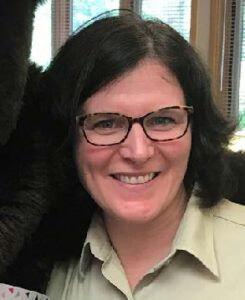
Irrigation Leader: Please tell us about your background and your current position.
Kelly Lawrence: I’ve worked for the Forest Service for almost 17 years. I started as a research assistant for a team of social scientists in Seattle; became a partner and volunteer coordinator in Sedona, Arizona; moved to Klamath Falls, Oregon, where I was a planner responsible for the environmental and cultural compliance of our projects; and most recently, was the district ranger of the Naches District of the Okanogan-Wenatchee National Forest. In that position, I was responsible for over 500,000 acres of forest on the eastern side of the Cascades. Nearly half the district is in three different wilderness areas. We worked collaboratively with the Yakama Nation, the Washington Department of Natural Resources, the Nature Conservancy, recreation user groups, and others to plan and implement restoration projects in the district. The district has about 30 full-time employees, and as many as 100 employees during the summer season. It has lots of visitors who come to camp and boat. It also has active fire-prevention and fire-suppression programs, as the district is a fire-adapted ecosystem. I’ve recently accepted a new position as the forest supervisor of the Olympic National Forest and will start on Memorial Day.
Irrigation Leader: Why did you apply to the AgForestry Program?
Kelly Lawrence: A friend from Rotary told me about AgForestry and said that I’d be a good fit for the program. I was also interested in learning from other industries about how to improve our own organization.
Irrigation Leader: Please tell us about your experience of the program. What was the most valuable part of it?
Kelly Lawrence: Learning about agriculture in Washington State and learning about the role of a port and a port district. I loved the collaborative development role of the port districts. Because of my time in the Peace Corps, I’m interested in community development. The conversations with the port district employees really piqued my interest and made me want to get involved. I was interested in how the port districts work with the business community, especially in smaller communities, to help start-ups and provide a community of businesses that hold each other up and bring energy to the town.
Irrigation Leader: Please tell us about your trip to Cambodia and Vietnam. What did you see?
Kelly Lawrence: A wide variety of agricultural, educational, cultural, and historical sites. We saw quite a few tourist sites that are important to the countries’ economies and learned about their postwar natural resource protection and restoration activities.
Irrigation Leader: In what way was the land management there similar to or different from in the United States?
Kelly Lawrence: Vietnam and Cambodia face many challenges that go well beyond those we generally think about. There are many relics of war, like land mines in Cambodia, that make it almost impossible for people to go out and enjoy the forest. They also struggle with hunger and need to get all they can from the forests. We visited a national park that was working hard to help visitors understand the rich biodiversity it was privileged to steward. I was impressed by the employees, scientists, and volunteers there, who were dedicated to protecting the wild spaces they had left.
Irrigation Leader: How will the trip inform your professional work?
Kelly Lawrence: Having compassion and empathy for other cultures is always useful in my professional work. I work with communities of interest that can vary widely, and it is always important to listen carefully and with empathy, recognizing those communities’ values and beliefs. It helps me to know how to better manage public lands for all people.
Irrigation Leader: How will your experience in the AgForestry program as a whole inform your professional work in the future?
Kelly Lawrence: AgForestry introduced us to all kinds of leadership lessons and resources. It also put our roles into a larger state and regional context, helping us make connections and make better strategic decisions, based on the overall economic and natural resources situation of our state. It really gave me a greater appreciation of and love for where I live and how valuable our natural resources are to the world. It was so cool finding Washington apples in Vietnam! It was also really cool to know that Forestry Service professionals were working at the forestry school we visited in Vietnam. The connections are remarkable. I’m also taking away a great group of friends and colleagues from my time in AgForestry. These are folks that I can call on for any kind of advice or help at any time.
Kelly Lawrence is a forest supervisor in the U.S. Forest Service. She can be contacted at kelly.lawrence2@usda.gov.
Brock Leonard
Senior Agronomist, Sunheaven Farms Prosser, Washington
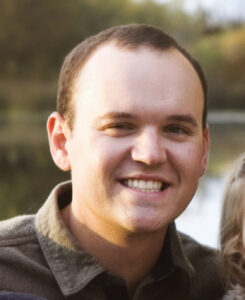
Irrigation Leader: Please tell us about your background and your current position.
Brock Leonard: I grew up in a small farming community. I did not grow up on a farm, but I worked on farms during high school and after. In college, not knowing what I wanted to do, I decided to take an introductory plant science class. I thoroughly enjoyed the science of growing crops and seeing a seed go in the ground and grow into something that could be harvested. I was instantly hooked. I earned a bachelor’s degree in agronomy and plant science from Brigham Young University–Idaho in Rexburg, Idaho, and then pursued and completed a master’s degree from the University of Missouri in plant, insect, and microbial sciences with an emphasis on plant science and technology. After graduation, I moved back to Washington and worked for a small company doing irrigation scheduling; soil-moisture monitoring; variable rate irrigation; and field mapping, which helps in running variable rate inputs. After that, I started working at Sunheaven Farms as an agronomist. I trained for about 3 years with the agronomist here, and when he retired, I took over his position as the senior agronomist. Sunheaven Farms is partnership of five family farms totaling 24,000–25,000 acres per season. The farms grow a variety of crops, including onions, bluegrass seed, sugar beets, peas, beans, field corn, and wheat, for all of which I manage the agronomic recommendations.
Irrigation Leader: Why did you decide to apply to the AgForestry program?
Brock Leonard: My general manager suggested it. He really liked the program and wanted me to have the opportunity to improve my leadership skills. I had also heard good things about AgForestry from a couple of guys 4–5 years ago, which made me inclined to pursue it.
Irrigation Leader: Would you tell us about the experience of the program?
Brock Leonard: The first few seminars are dedicated to learning about our leadership skills. We got together and worked on team building and personality profiles. After that, we focused on the application of those leadership skills in the workforce. For example, we got to tour the Port of Seattle and talk with the harbor masters and the folks who manage the container ships. We got to hear about their crisis management. How would they handle an accident on the dock? Back in 2014, dock workers went on strike. How did they deal with that? We not only got to see and hear about their successes, we heard about their failures, too. That was unexpected because most people don’t want to talk about their failures. But the gentleman who spoke to us said that sometimes, in order to get to success, you have to fail along the way.
Another important experience was our trip to Vietnam and Cambodia. I didn’t expect to see some of the technological innovation I saw there. For example, we saw people who had developed a system to more easily crush rice into a paste to make rice noodles. They used to do it by hand with a mortar and pestle. Now they had developed a giant stone mill that was lashed around with ropes and was used to crush the rice faster and with less labor. It was fascinating to see that innovation in action.
Irrigation Leader: What sorts of agricultural methods did you see in Cambodia and Vietnam?
Brock Leonard: I had never witnessed horse- or oxen-drawn tillage equipment until this trip. We visited a farming village in Cambodia where they used a giant ox to pull the plow through the field in preparation for rice planting. Most of the crops we saw were planted and watered by hand, which is also something I’m not used to seeing. In this village, one person was in charge of the equipment and animals for tilling, another family was in charge of planting the rice, another family was in charge of watering and weeding the field, another family was in charge of harvest, other families were in charge of crushing the rice and making noodles, and another person was in charge of selling them. Each family had its own specific role in the overall process. Seeing them function together as one fluid group reminded me a of a co-op I worked with in the Midwest.
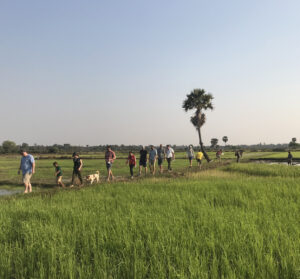
In terms of irrigation, most of what we saw in Cambodia was flood irrigation. There was some sprinkler irrigation, but it was pretty simple stuff, similar to the technology you might use to water your lawn.
In Cambodia, we toured the Royal University of Agriculture. That university has an extension service that is similar to the university extension services we have in the United States. They do research at the university, which serves as the main hub, and then transfer that information through the extension services around the country. Witnessing how excited the students there were to talk with us made it probably my favorite stop on our whole trip.
I noticed that even though the people there didn’t have the fanciest equipment, they seemed really happy. They had smiles on their faces. They thought it was cool that we were fascinated by their work. That was a really fulfilling part of the trip.
Irrigation Leader: How will the AgForestry program as a whole inform your professional work in the future?
Brock Leonard: One of the big things that I learned is that having a meeting just to have a meeting is a waste. In AgForestry, we held seminars on how to have successful conferences or meetings. We focused on elements like starting the meeting on time, no matter who’s in the room; making sure you have a purpose for your meeting; and reducing the number of meetings to the number necessary to get the work done. That’s one thing that we’ve adjusted at Sunheaven Farms: Instead of having a meeting every other month, we now hold meetings on a quarterly basis and send out informational newsletters once a month. By reducing the number of meetings, we’ve increased the quality of each meeting.
Another thing that I brought back from AgForestry is the importance of letting employees know about their value and the trust you have in them. That doesn’t necessarily mean praising them in front of everyone, but it means making sure they know.
One of the most valuable parts of AgForestry was the training we did in Olympia and Washington, DC, about how to speak publicly and engage in the legislative process. I was asked by the folks here at Sunheaven to go to Olympia in January and speak in opposition to a senate bill that would ban the use of Chlorpyrifos insecticides in Washington State. It was a great learning experience in itself, but I was also better prepared to do it because of my time in AgForestry.
Brock Leonard is the senior agronomist at Sunheaven Farms in Prosser, Washington. He can be contacted at brock@sunheavenfarms.com.
